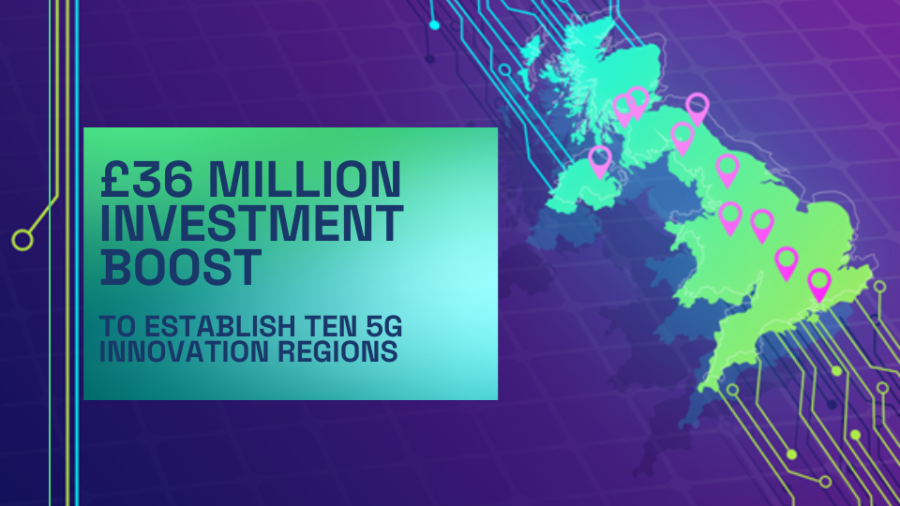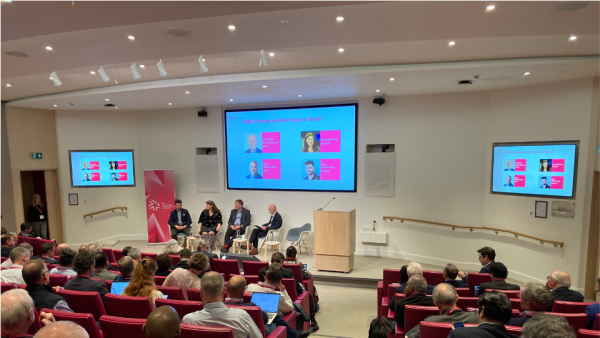10 areas across the UK from Glasgow to the West Midlands will receive a share of £36 million to accelerate 5G-enabled innovation

- Funding will see 5G Innovation Regions invest in local projects to boost advanced wireless connectivity across a wide range of sectors, including public services, sustainable farming and road safety
- New Digital Infrastructure Advisory Group launched to support regions to adopt 5G and other advanced wireless tech
Local areas across the UK will be helped to boost their digital connectivity and adopt advanced wireless technologies, including drones to monitor crops and livestock, smart systems to reduce congestion, and portable 5G networks to enable super-fast live broadcast from remote locations.
Announced today, ten winning multi-local authority areas spanning all four parts of the UK will receive a share of £36 million as they become 5G Innovation Regions. The funding will drive the development and adoption of 5G and other advanced wireless technologies - making sure communities in towns, cities and rural areas take full advantage of the benefits advanced wireless connectivity and digital technologies can provide and attract commercial investment to grow the economy.
Amongst those set to benefit is Glasgow City Region who will receive over £3 million to deliver a health and social care focused project that will use advanced wireless technology, such as the Internet of Things (IoT) and smart city applications, to make public services better. The project will specifically focus on monitoring and maintaining assets, creating environmentally friendly social housing, and improving the monitoring of health and social care services.
Elsewhere, Greater Manchester Combined Authority will receive over £3 million, part of which will be used to 5G-enable hundreds of air source heat pumps across social housing in the region. By using 5G the UK will accelerate the creation of Smart Energy Grids and bring forward benefits for residents, industry and public services by allowing them to better monitor energy use and save money on their bills.
A key commitment from the Government’s Wireless Infrastructure Strategy, the 5G Innovation Regions programme is designed to boost innovation in sectors such as advanced manufacturing, transport, agriculture, creative industries, and public services, helping to create better connected places across the UK. These projects will stimulate demand for 5G connectivity, bringing the government's vision of unlocking the power of cutting-edge 5G wireless and digital technologies to life, with research showing widespread adoption could result in productivity benefits of £159 billion by 2035.
Today’s announcement comes as a new advisory group with representatives from all four parts of the UK is launched. The board will support local areas to put recommendations to government on how to support their digital connectivity goals, encourage investment, and promote adoption at a local level.
Minister of Data and Digital Infrastructure Sir John Whittingdale said:
"We’re channelling millions into local areas to unlock the potential of cutting-edge 5G wireless and digital technologies which will reshape our public services, drive economic growth and boost innovation. This new fund will give local areas from across the country the opportunity to be at the forefront of Britain’s world-leading 5G revolution.
“For instance, by using 5G for farming and creating science parks, we're not just helping local communities, but also encouraging new ideas all over the UK. This is more than just linking smartphones. It's about using powerful digital connections to transform various sectors in the economy and the public sector throughout the entire country.”
The successful regions will lead on delivering the government’s vision set out in the UK Wireless Infrastructure Strategy, published in April, for communities across the UK to take full advantage of the transformative effect that advanced wireless connectivity and digital technologies can provide. This forms part of the UK Government’s wider ambition to drive telecoms innovation, ensuring more secure and resilient networks and a more diverse and competitive supply chain.
Each region faces a unique set of challenges and opportunities related to their location, local industries, and technology needs so the programme will demonstrate the scalability, replicability, and sustainability of each project, before disseminating project learnings and benefits.
Projects set to receive funding are:
- Belfast City Council [£3.8 million]: use 5G tech to digitise port operations; ‘5G-in-a-box' technology for high-capacity uplinks for on-location filming and production studios; and exploiting advanced wireless connectivity on transport routes.
- Greater Manchester Combined Authority [£3 million]: 5G-enabled heat pumps to accelerate the creation of Smart Energy Grids; and a digital road network to reduce congestion and carbon emissions
- West Midlands Combined Authority [£3.8 million]: scale proven 5G applications in advanced manufacturing and smart communities through new adoption hubs.
- Oxfordshire County Council [£3.8 million]: creation of 5G Science Parks at the Harwell campus in Oxfordshire supporting R&D in Quantum, Space, Health, and Energy Clusters
- North Ayrshire Council [£3.8 million]: new Regional Strategic Wireless Innovation Hubs will place Ayrshire as a UK leader in advanced manufacturing by accelerating the adoption of digital and wireless technologies.
- Sussex County Council [£3.8 million]: develop and scale 5G applications to support future farming and growing practices that increase sustainable food and drink productivity.
- Cumberland Council [£3.8 million]: Use 5G and advanced wireless tech at key sites across the Borderlands Region to demonstrate how it can help build the tourist economy, protect the environment and local businesses.
- Shropshire Council [£3.7 million]: embed advanced wireless connectivity technology at the heart of technological innovation across rural industries, water management and public services.
- Sunderland City Council [£3.8 million]: 5G-enabled port operations to enhance port competitiveness and safety, and Cooperative Intelligent Transport Systems that improve road transport efficiency.
- Glasgow City Council [£3.2 million]: use Internet of Things and smart city applications for Asset Monitoring and Maintenance, Net Zero Social Housing, and Health and Social Care Monitoring.
The UK Telecoms Innovation Network (UKTIN) will also run a nationwide programme to drive the adoption of 5G and advanced communication technologies in key economic sectors, including manufacturing, health and social care, transport and logistics, and agricultural technology. UKTIN will be working closely with the 5G Innovation Regions, including through place based working groups, helping businesses and places from across all parts of the UK benefit from access to this transforming technology.
Nick Johnson, Head of the UK Telecoms Innovation Network (UKTIN) said:
“We’re thrilled to see the recipients of the 5G Innovation Regions fund encompassing a broad range of places across the country, helping to boost the adoption of advanced communication technologies across a range of vertical sectors.
“While this is fantastic news for the ten regions chosen, UKTIN will play a pivotal role in taking their innovations and learnings to the whole of the UK.
“We will collaborate with successful regions to overcome adoption hurdles and deliver best practice and insights to communities across the country, so that all regions and nations can benefit from the lessons being learned through both 5G Innovation Regions and other relevant initiatives.”
Hamish MacLeod, Chief Executive of Mobile UK said:
“The announcement of the winning innovation regions, backed up by £36m of Government funding, is a welcome step towards spurring innovation in 5G and mobile connectivity.
“We look forward to working with the winning regions in demonstrating the significant potential of 5G technologies to revamp and modernise public services across the country.”
Improved connectivity through 5G and advanced wireless technologies could have a transformative effect on local areas, providing faster, more reliable, and more secure connectivity for residents and businesses, boosting local economies, and improving the delivery of public services.









